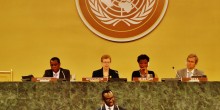DfAD, alongside AFFORD and Comic Relief, was one of the UK based non-profit organisations that participated in the UN Informal Interactive Hearings on International Migration and Development at the UN General Assembly held in New York on 15 July 2013. DfAD’s participation focused on the theme: Human Development, Diaspora Action; (1) Ensuring migrants’ and migration’s rightful place on post-2015 development goals and (2) Engaging migrants and diaspora as entrepreneurs, social investors and policy advocates in development. We are proud to have also contributed to raising the diaspora voice on migration and development issues. Check out the photos here.
AFFORD’s Chair, Gibril Faal, gave an address to the General Assembly session. You can view the full speech here.
You can also read the full text of Mr. Faal’s speech below:
United Nations High Level Dialogue on Migration and International Development
HLD Civil Society Steering Committee Member, Director of GK Partners
& Chairman of African Foundation for Development (AFFORD)
Office of the President of the General Assembly
Informal Interactive Hearings on International Migration and Development
General Assembly Hall (NLB), New York, 15 July 2013
Your Excellencies, Ladies and Gentlemen.
Today, I speak with you about migrants and diaspora as partners in development. On this topic, we have all become Galbraithians. For it was the Canadian-American economist John Kenneth Galbraith, who told us, that: “Migration is the oldest action against poverty. It is good for the country to which they go; it helps break the equilibrium of poverty in the country from which they come”. Given what he took to be primal facts, Galbraith wondered: “What is the perversity in the human soul that causes people to resist so obvious a good?”
I posit that people migrate for two broad reasons; to protect life, limb and liberty; or to enhance livelihood and lifestyle. Individuals – bakers and bankers, cleaners and clinicians, seek advancement and development for themselves, their families and communities. These migrants, and their children, and the children of their children often retain a natal, parental and ancestral memory of the country of heritage. This sublime diaspora memory of belonging, compels them to play their role in the development of the country of heritage.
In most instances, fulfilment of this duty and desire becomes easier when migrants and the diaspora are integrated and successful in the country of residence. Thus it is an innate interest of the migrant, that she is a good and productive citizen, in her diaspora life of duality and trans-nationality.
In the past ten years, many national governments, multilateral institutions and other agencies with mandates to enhance human development have recognised that they share a common purpose with the humble migrant, and her age-old ambitions. Despite this commonality of purpose, I hear grumblings. Sometimes from outraged officials, often from disgruntled diasporas. Both bemoan the difficulties of working with the other. Evidently, there is an absence of effective common modalities for working together.
Currently, at best the relationship is one of prospection – of occasional exploratory engagement. At worst, it is one of suspicion and mistrust. Verily, genuine partnership can only exist when suspicions are allayed and prospection surpassed. There are beautiful theories about how to achieve this. Yet the only practical way is through actual, direct, consistent and substantive engagement. Therefore, today, I offer nothing but a reminder, brutal in its simplicity.
For partnership to work, common purpose is not enough. Institutions should understand, acknowledge, value and support migrant and diaspora initiatives – as will be presented today. These already reflect their specific circumstances and characteristics, and their long term strategic objectives.
Migrants and diaspora suffer from consultation fatigue. They crave substantive participation, whereby they act and speak for themselves – supported by their friends and advocates. They are and should be treated as principals in any engagement; not recipients of enlightened benefaction.
Engagement should yield tangible, practical, short term results, incorporating capacity building to further enhance medium and long term participation and action.
For participation to work, common purpose is not enough. Migrant and diaspora organisations should be constant in being merchants of solutions and hope, not peddlers of problems and doom.
We should focus on themes on which we have expertise and experience; insist on efficiency and excellence as a moral imperative, as we reject wasteful indulgences. We should professionalise more of our activities, without killing off the volunteering and self-help input and ethic that motivates us and enhances our work.
There then is a possible framework for practical partnership – common purpose and agreed modalities for enhanced results and greater human development. In his classic book ‘Things fall apart’, the Nigerian writer Chinua Achebe wrote: “When we gather together in the moonlit village ground it is not because of the moon. Every man can see it in his own compound. We come together because it is good for kinsmen to do so.”
And the American writer Christopher Morley, philosophised that: “There are three ingredients in the good life: learning, earning and yearning.” And now I remember; people migrate to learn, earn or yearn for a better life. The migrant wants a good life for herself, her family and community. She wants development. Like Galbraith, I too wonder, in mild exasperation, what is it that is so evil in wanting a good life? What is it, I do not know.
Thank you.
Gibril Faal, New York City, 15 July 2013.



No Comments to "UNHLD – Remarks by Mr Gibril Faal"